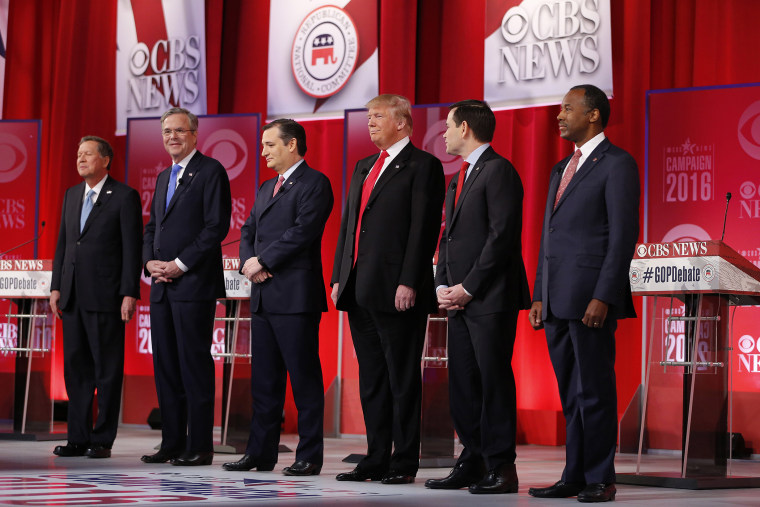On Saturday night, about midway through the ninth debate for the GOP presidential candidates, Republican pollster Frank Luntz made clear how unhappy he was with the discussion. "Seriously, this is insane," Luntz
said. "The GOP is destroying itself tonight, and they have no one to blame but themselves." The pollster
added that independents "will look at the viciousness and chaos" of the debate and say, "I don't want that."
Around the same time,
National Review's Rich Lowry, a prominent figure in conservative media, described the debate as a "
train wreck." David Frum
added, "Does this look to America like a party ready to govern anything?"
To appreciate why, it's important to understand that this was less of a debate and more of a demolition derby, Jeb attacked Trump. Trump attacked George W. Bush. Rubio attacked Cruz. Trump attacked Cruz. Cruz attacked Rubio, Trump, and Jeb.
Looking over
the transcript, I count five references to the word "liar," and 15 instances in which a candidate use the word "lie," "lied," or "lies." There were two references to mooning, and one reference to a "child molester" accusation.
At one point, CBS News' John Dickerson, who shouldn't be blamed for any of this mess, felt compelled to tell the Republican candidates, "Gentleman, we're in danger of driving this into the dirt."
It made for a debate that was difficult to watch -- and even more difficult to actually learn anything -- but it was a reminder of the role Trump has played in influencing the state of the Republican discourse. The
New Republic's Jeet Heer
highlighted this point well:
There's no better proof of the success of Trump's tactics than the imitation of his rivals. On Saturday night in South Carolina, with the notable exceptions of John Kasich (who tried with some success to play the adult in the room) and Ben Carson (who remains a strange wraith-like figure sleepily indifferent to everyone else on stage), the other candidates vied to outdo each other in insults.
We've all spent a lot of time in recent months thinking about the rise of Trump, but the rise of Trumpism is nearly as important.
It wasn't just the debate, of course. Note that Marco Rubio was struggling to gain any real traction for months, the love of the Republican establishment and much of the media notwithstanding, but he saw his support in Iowa grow steadily after he started
embracing Trump's message as his own -- telling Iowans, for example, that the United States is "in decline" and that the American dream is "dying."
And on Saturday night, it was clear that others have made a related calculation: if you can't beat Trump, maybe it's time to join him. TPM's Josh Marshall
added:
I don't think there's ever been a presidential debate where so many of the candidates have called each other liars so many times. At some moments the trash talking and chest-puffing and general drama got so intense I thought this might be a fair approximation of West Side Story if you'd written it about two battling country clubs, the plutocrats versus the plutocrat flunkies. [...] [T]his was the debate where Donald Trump finally succeeded in bringing the whole party down to his level.
I don't know if Trump is going to win the Republican nomination, but I do think he's already won in reshaping the party's message and the direction of the 2016 nominating fight.
